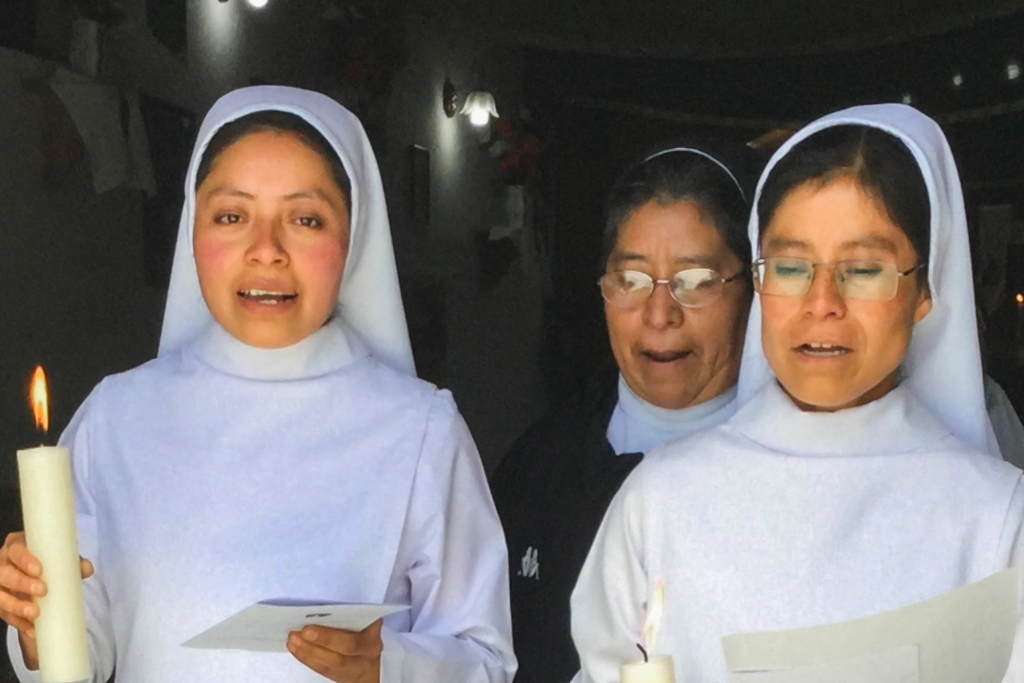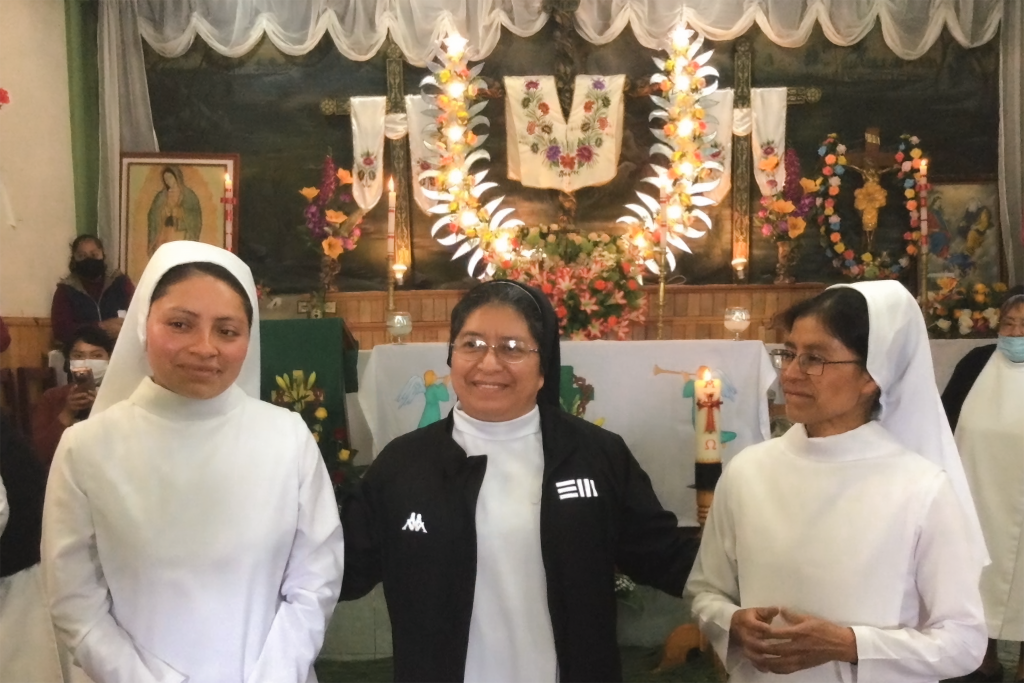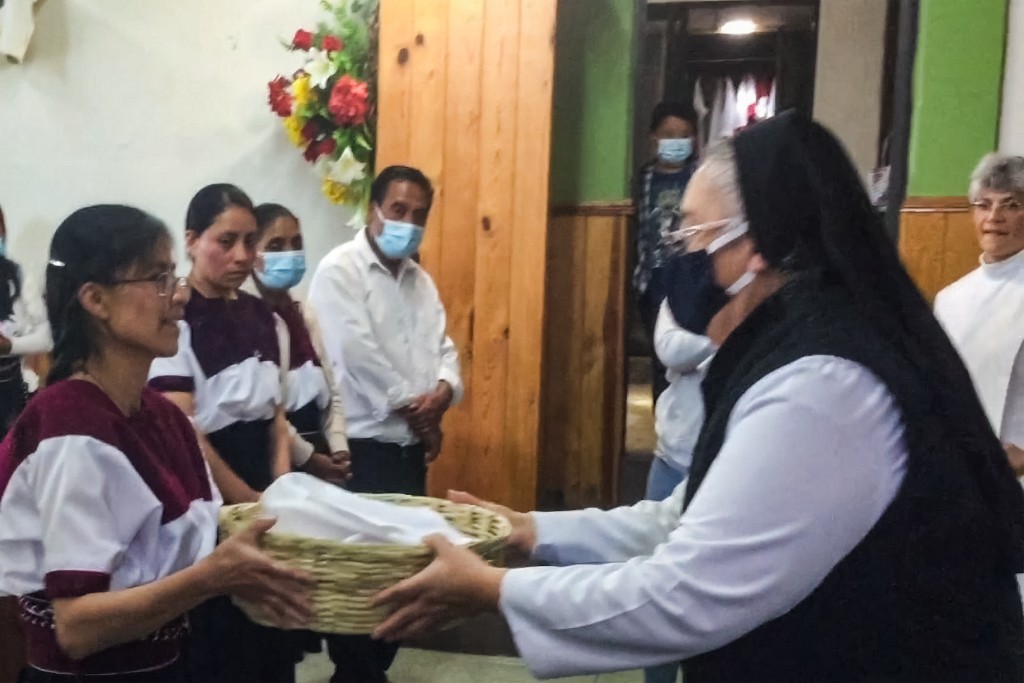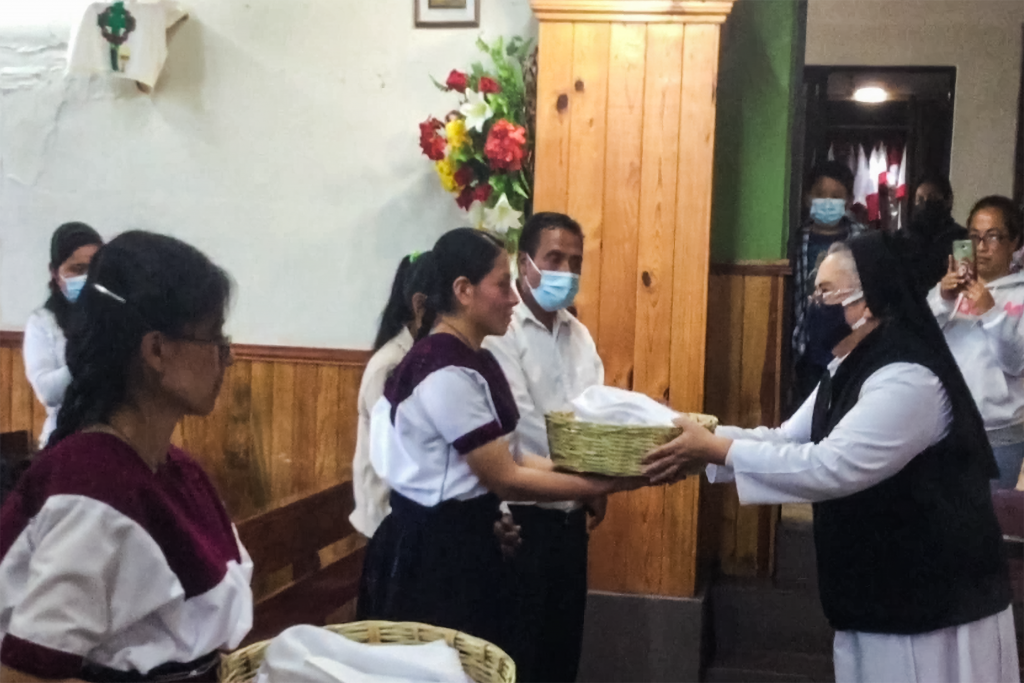The Call of Love
From the Mexican Province of the Dominican Sisters of Mission San Jose

Two indigenous Tzotzil Mayan women, Dionicia Díaz Ruíz and Martha Hernández Santiz, entered the novitiate of the Dominican Sisters of the Congregation of the Holy Rosary in San Cristobal, Chiapas, Mexico on October 7, 2021. The Rite of Initiation into Religious Life was celebrated in a small chapel next to their convent.
After the candidates expressed their desire to enter the novitiate, Sister Rosa Pérez Godínez, Prioress of the Mexican Province of Cristo Rey, accepted them. The mothers of Dionicia and Martha blessed their habits with incense according to Tzotzil tradition. Then Sister Rosa blessed their scapulars, gave them their religious titles, and presented to them the Dominican habit.
The decorations in the small chapel reflected the novices’ love for creation and honored their Mayan culture. Long, green pine needles clothed the aisle and the altar. Swaths of rich, green fabric were draped across the ceiling above the pews. The rite of reception began with the “entrance of the flowers” where every participant walked in with a white rose that symbolized truth in Mayan spirituality. Due to the pandemic, only family and a few sisters were present. Most were masked. The beautiful presentation reflected both the solemn nature of the occasion and the joy of responding to God’s call.

Heritage and History
Dionicia and Martha learned Spanish to better serve in the health ministry in their village. Education was not a local cultural priority for women, but both young women were driven by their desire to learn. Dionicia was unable to continue school after the elementary grades. Martha could not continue her education due to family financial constraints. The Dominican Sisters offered them, and other young, local women, the opportunity to study courses that fortified their culture. Dionicia and Martha gladly accepted. With their group, they named their school “jchimoté” in Tzotzil or “Our Growing Tree”.
Dionicia and Martha maintained their cultural identity as they pursued candidate formation for the Congregation. In fact, Martha feels that the journey deepened her understanding of herself and her heritage. Both women continue to speak Tzotzil, wear their traditional dress, eat local foods, and practice their Mayan spirituality. They also pray and serve people in their villages. In formation, their relationship with God flourished.
In her studies, Martha has learned about God’s directive to care for the environment. This has strengthened her connection with Mother Earth and reinforced her knowledge that all people are part of God’s creation. Through this, she has gained the understanding that she can be both a Tzotzil Mayan woman and a Dominican Sister. Dionicia finds value in and honors her Mayan culture. She vows that she will not forget it.
Hearing the Call
The story of Dionicia and Martha is not only about cultural dignity, but their response to God’s loving call to serve. These women did not always have religious life in mind. It was their love of learning and service that connected them with Sisters Helena Im and Francisca Quintero Osorio (Paqui). Sweet friendships and a sense of closeness developed among the four women. As ongoing learning was a desire, the Sisters’ offer to study quickened Dionicia’s heart. As she spent time with them, she heard and admired the way they prayed. The Sisters asked her what she imagined doing with her life. This gave her something she hadn’t had before, a license to dream. Images of walking with the Sisters frequented Dionicia’s nighttime slumber. Through this, God deeply touched her heart. She knew, that despite the potential sorrow of leaving her mother and family, God was leading her into religious life.
Martha found purpose in serving others but yearned for something more. Relationships with Sisters Helena and Paqui also played a key role in discerning her future. Martha took time to learn how to listen to God and hear his direction. She felt some fear and insecurity about committing to religious consecration. However, through contemplation, prayer, and conversations with the Sisters, Martha felt that something called her from within. Her path became clear.

Transformation
Rites of passage, such as an initiation into religious life, bring about change. Daily existence is not the same. Days filled with prayer and meditation have brought Dionicia a deeper understanding of her emotions and how to share them. This knowledge makes her stronger. Now she desires to use these skills to help women in her village improve their family life.
The advent of Martha’s commitment is marked by happiness and a sense of assurance that she is following God’s path. She feels His presence and is aware of His continual help. Her world and thought life have also broadened. She now lives with women from cultures other than her own. Hearing their perspectives has expanded and further defined her sense of self. Martha has also found a new passion: the Care of Creation. She contemplates the ethics of sufficiency, finds great respect for Mother Earth, and believes humanity should take only what is needed.
A Look Forward
Both Dionicia and Martha embrace the future. They know that specific plans remain uncertain but move forward with confidence. They have heard the call of love and are compelled to respond with commitment, devotion, service, and reciprocal love. They honor their indigenous heritage and take their place in society as women with purpose. Martha and Dionicia are loved by God and have committed to being vessels that pour out His love to His people and His world.

About Chiapas
Chiapas is in Southern Mexico, and borders Guatemala. It is home to more than 5.2 million people, and it is one of Mexico’s most indigenous states. 36% of population are considered indigenous. 29% of those speak only their native tongue.
Bibliography
- History.com Editors. (2018, August 21). Chiapas. History. https://www.history.com/topics/mexico/chiapas
- Ruiz, D. (2021, December 1). Zoom communication [Translated Interview].
- Santiz, M. (2021, December 1). Zoom communication [Translated Interview].
- Schmal, J.P. (2019, October 15). Chiapas: Forever Indigenous. Indigenous Mexico. https://indigenousmexico.org/chiapas/chiapas-forever-indigenous/
 USA
USA


